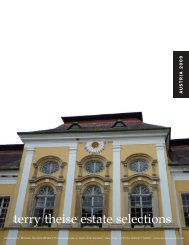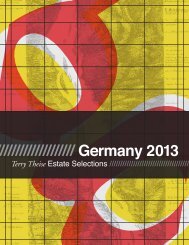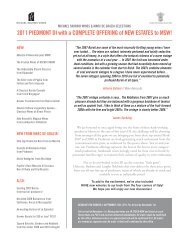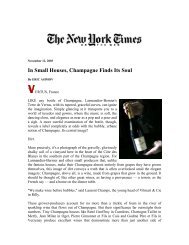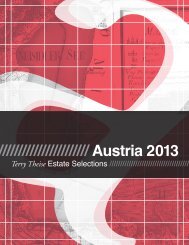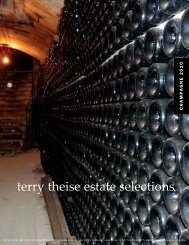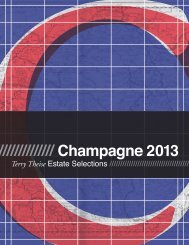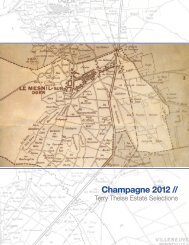German Catalog 2006 USE THIS ONE.qxp - Michael Skurnik Wines
German Catalog 2006 USE THIS ONE.qxp - Michael Skurnik Wines
German Catalog 2006 USE THIS ONE.qxp - Michael Skurnik Wines
You also want an ePaper? Increase the reach of your titles
YUMPU automatically turns print PDFs into web optimized ePapers that Google loves.
150<br />
why does place-specificity matter?<br />
Once upon a time I sat on a panel discussing spirit-of-place,<br />
and a native-American woman to my left<br />
said something that lodged on my heart and has not<br />
moved since.<br />
The salmon do not only return to the stream, she<br />
said, in order to spawn; they also return in order to<br />
respond to the prayers and hopes of the people who<br />
love them.<br />
I thought that remark was innocuous enough, so I<br />
was taken aback when someone responded it was “pretentious<br />
New Age bullshit” (or words to that effect). I<br />
recognize there are sensibilities other than mine, more<br />
linear, more prosaic. Yet with all respect, most thoughts<br />
along the “mystical” continuum are reducible to linear<br />
equations if one wishes to frame them thus.<br />
No, the salmon aren’t actualy thinking “let’s go<br />
back to the river guys, cause the Indians are waiting for<br />
us.” No one means to say that. There is, though, among<br />
certain peoples, an immersion into nature different<br />
from our I-thou relationship, an inchoate assumption of<br />
unity among living things. The idea of the salmon<br />
“responding” is poetic, but the notion of interconnectedness<br />
is entirely reasonable.<br />
That assumption of a unity of living things underlies<br />
my own assumption that places have spirit, and<br />
wine is one of the ways places convey their spirits to us,<br />
and this is significant because we are in fact connected<br />
(even if we deny it or are unaware), and if we claim<br />
that wine is an important part of life then wine must be<br />
bound into and among the filaments by which we are<br />
connected to all things. <strong>Wines</strong> which simply exist as<br />
products to be sold must take their places alongside all<br />
such commodities, soda, breakfast cereal, vacuumcleaner<br />
bags. They can be enjoyable and useful, but<br />
they don’t matter.<br />
Spirit-of-place is a concept that’s like really good<br />
soap; it’s lovely, it feels good when it touches you, and<br />
it’s slippery as hell.<br />
It isn’t announced with billboards, you know. Spirit<br />
Of Place, five miles ahead, bear right to access. Not like that.<br />
Nor is it necessarily beautiful. The northernmost sec-<br />
tion of the New Jersey Turnpike is full of spirit-of-place,<br />
however repugnant it may be. I’d say it comes at the<br />
moment of ignition between your soul and that place,<br />
and a condition of that union is that it happens aside<br />
from your awareness. It is an inference, as all soul<br />
things are.<br />
I was driving down an especially inviting road<br />
through a tunnel of huge elms, appreciating the tranquility<br />
of the Champagne countryside. Odd, I thought,<br />
that such a vivacious wine hails from such serene land.<br />
But then I realized the vivacity of Champagne is the<br />
voice not of the landscape, but of the crisp nights of<br />
early September, and the cool days of June, and the wan<br />
northern sun that seldom seems to roast. And the still<br />
wines are not vivid in the way that young Riesling or<br />
Muscat is. They are pastel, aquarelle, restrained, gauzy.<br />
Add bubbles and they get frisky. But they aren’t born that<br />
way. Didier Gimonnet told me he’d been pestered by an<br />
English wine writer to produce a tiny amount of supercuvee<br />
from an 80-year old vineyard he owns . . . “I’ll<br />
never do it,” he insisted, “because the wine would be too<br />
powerful.” But isn’t that the point, I thought? Isn’t that<br />
what wine’s supposed to do in our skewered age?<br />
Density, concentration, power, flavor that can break<br />
bricks with its head! “I think Champagne needs to have a<br />
certain transparency in order to be elegant,” he continued.<br />
And then it came to me.<br />
Here was the Aesthetic to correspond with the gentleness<br />
of the Champagne landscape. A pays of low<br />
hills, forested summits and plain sleepy villages isn’t<br />
destined to produce powerful wines. We have become<br />
so besotted by our demand for impact that we’ve forgotten<br />
how to discern beauty. And who among us ever<br />
tilts a listening ear to hear the hum of the land?<br />
One reason the old world calls to us is that these<br />
lands do hum, a low subterranean vibration you feel in<br />
your bones. It has existed for centuries before you were<br />
born. It isn’t meant to be fathomed. It is mysterious, and<br />
you are temporary, but hearing it, you are connected to<br />
great currents of time. And you are tickled by a sense of<br />
significance you cannot quite touch. It cannot be the<br />
same here. Each of us Americans is the crown of creation.<br />
We invented humanity. Nothing happened<br />
before us, or in any case, nothing worth remembering.<br />
Memory is a burden in any case. We turn to the world<br />
like a playground bully looking to pick a fight.<br />
“Waddaya got TODAY to amuse me, pal? How ya<br />
gonna IMPRESS me? How many POINTS will this day<br />
be worth?” Maybe our little slice of earth rumbles with<br />
its own hum, but if it does, not many Americans want<br />
to know how to hear it, and most are suspicious of the<br />
value of listening at all.<br />
Does spirit-of-place reside integrally within the<br />
place, or do we read it in? The answer is: YES. We are a<br />
part of all we touch, see, taste, experience. If we glean



